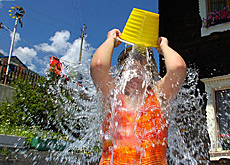Hot spell in July less deadly than feared

Despite cooler Friday temperatures, Switzerland has recorded the hottest July for 140 years, with temperatures up to 5.5 degrees Celsius higher than the month average.
But this year’s heatwave has not caused an increase in mortality figures, according to the Federal Statistics Office.
The number of people who have died since the start of the hot spell up to the middle to July is not greater than normal.
In Geneva the average temperature has hovered around 23.8C for the whole month, beating the 1983 record of 23C. In Zurich temperatures have also soared in July – up to 22.5C on average.
The exception has been the southern Alps, where the 1928 record temperature, 25C, has held strong. But most alpine measuring stations have observed their highest figures since 1983.
The Swiss meteorological office said July has been even hotter than the same month in 2003, when the county sweltered under a summer heatwave.
But despite the comparisons, the overall situation in 2006 is quite different from 2003, which witnessed particularly hot periods during the months of June and August, and an above-average July.
Normal death toll
The mortality figures published on Friday by the authorities show that the heatwave that has gripped Switzerland and much of Europe has not been deadlier than normal.
From the start of the hot spell up until mid-July the death toll has actually been lower than the ten-year norm.
Most years about 150 mainly elderly people die during the month of July as a result of the hot weather.
Peaks in the number of deaths for the second half of July are likely to influence average mortality figures, but they are still expected to remain within the normal range for that month, said the Statistics Office.
Southern canton Ticino imposed a speed limit on a busy stretch of the motorway last Sunday in a bid to combat particularly high ozone levels in the region. But the emergency measure was lifted later because of the cooler weather.
The Ticino environment office said it was still too early to see whether the measures had had a positive impact.
swissinfo with agencies
Several Swiss cantons – including Geneva and Zurich as well as mountain regions – have banned outdoor fireworks and bonfires due to the dry weather and possible risk of fires. This is likely to affect the National Day celebrations on August 1.
The July heatwave has particularly affected the mountain regions in Switzerland above 3,000 metres. The heat penetrates and melts the ice that holds together cliffs and rockfaces.
The Italian side of the Matterhorn mountain has been closed and attention is focused on the Eiger, where a 2 million cubic metre block of rock has started to collapse.
Number of days above 30 degrees Celsius between July 1 and July 23:
Sion 16C
Geneva 14C
Chur 13C
Basel, Bern 12C
The hottest day in 2006: 35.9C on July 25, Sion, canton Valais.
The hottest day ever in Swiss history: 41.5C in summer 2003, Grono, canton Graubünden.

In compliance with the JTI standards
More: SWI swissinfo.ch certified by the Journalism Trust Initiative










You can find an overview of ongoing debates with our journalists here . Please join us!
If you want to start a conversation about a topic raised in this article or want to report factual errors, email us at english@swissinfo.ch.